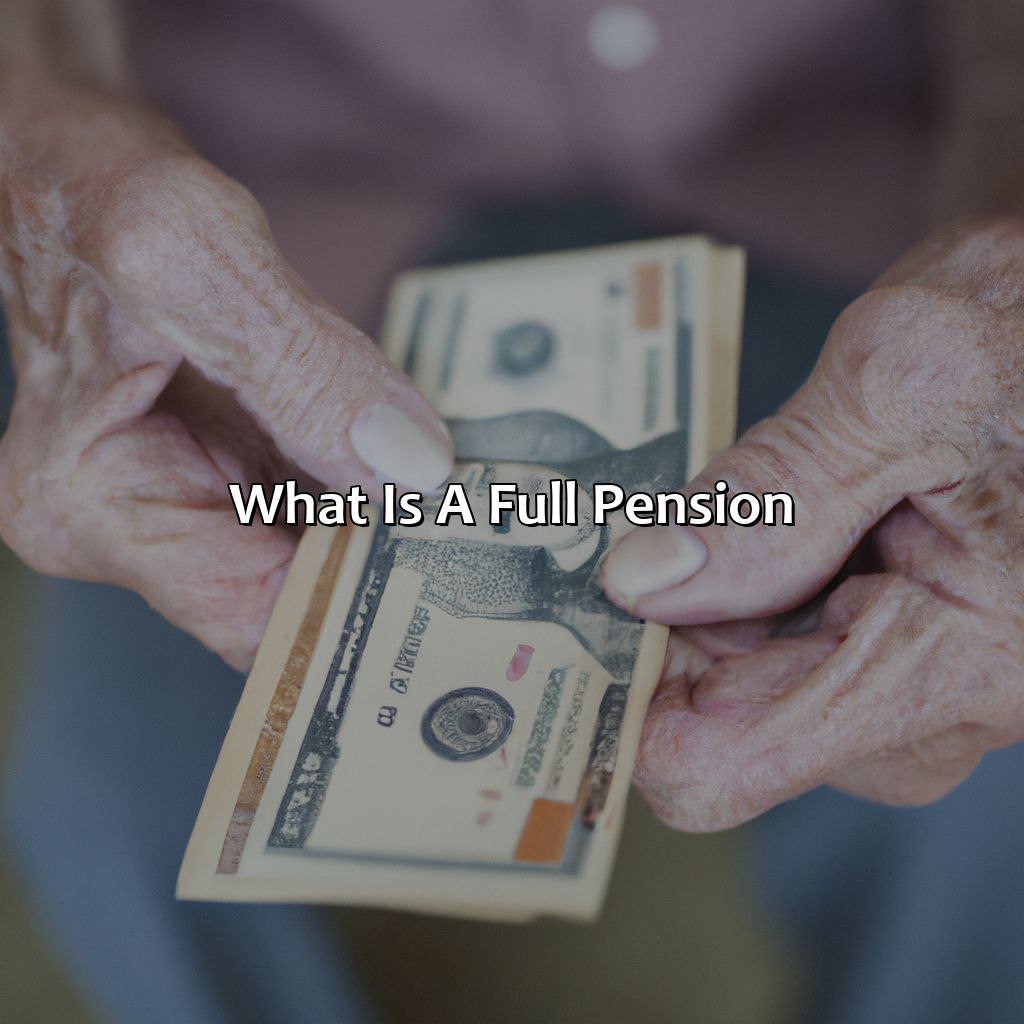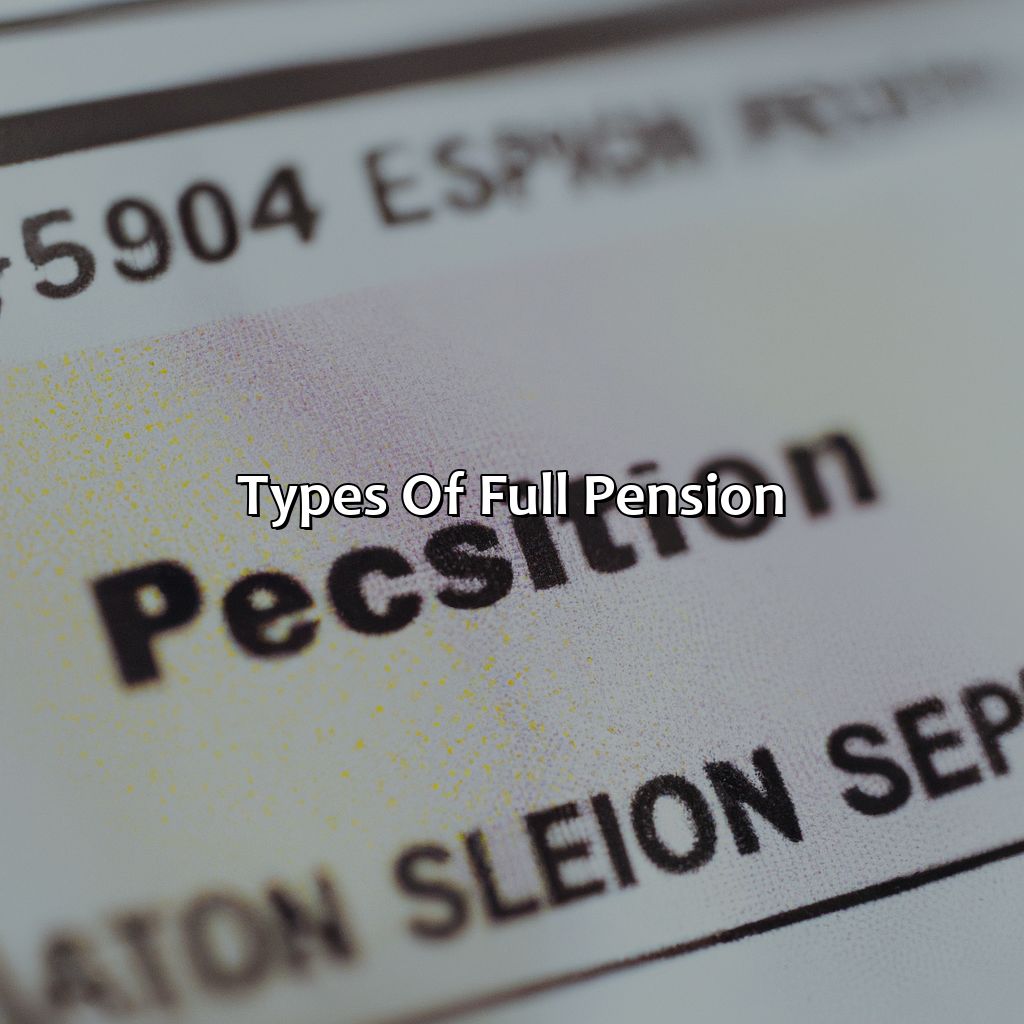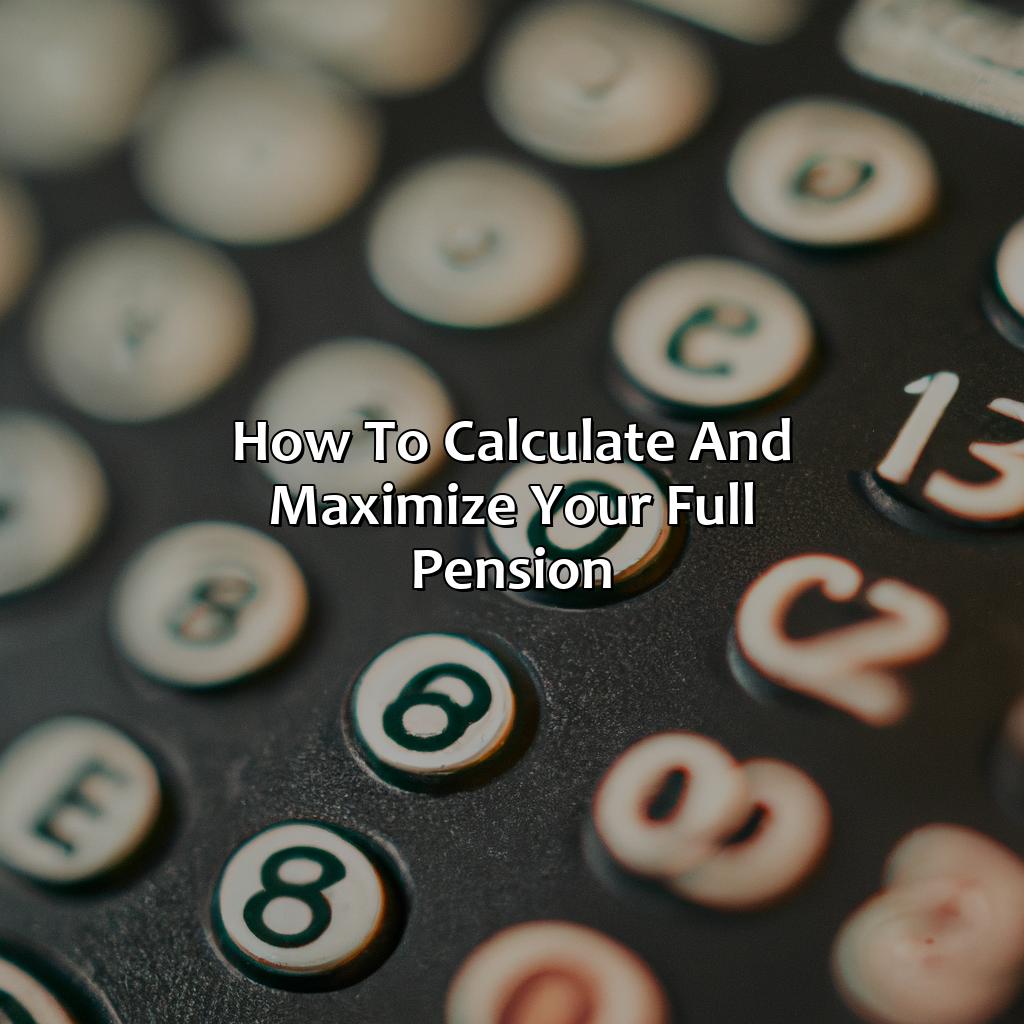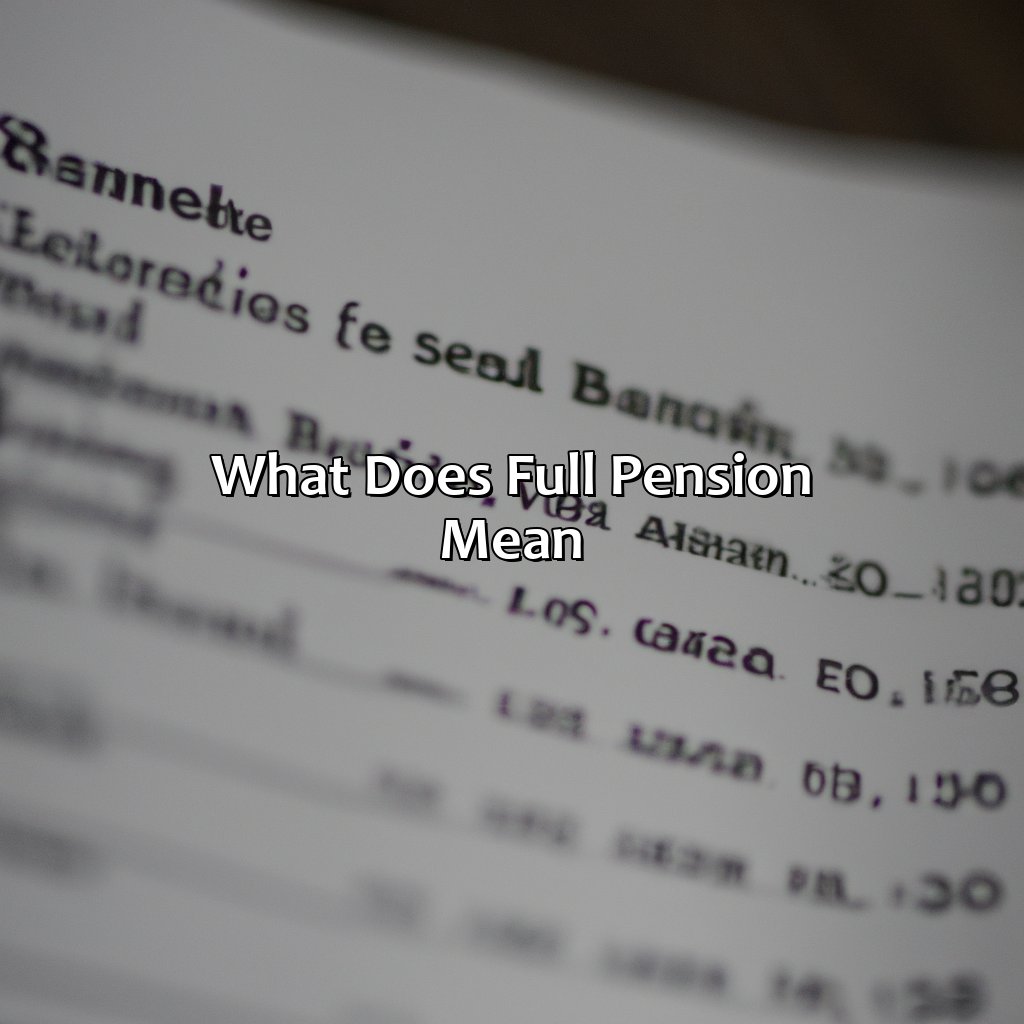What Does Full Pension Mean?
Key Takeaways:
- Full pension refers to the maximum retirement benefit that a person is entitled to receive from a pension plan, Social Security, or military service, based on certain eligibility requirements and factors such as age, years of service, and contributions.
- There are different types of full pension, including Social Security full retirement benefits, pension plan full benefit, and military full pension, each with their own rules and calculations.
- To calculate and maximize your full pension, you need to understand the factors that affect your benefit amount and explore ways to increase your benefits, such as working longer, delaying retirement, and taking advantage of tax-deferred savings options.
- The benefits of a full pension include financial stability in retirement, healthcare benefits, and survivor benefits for family members, which can provide peace of mind and security for you and your loved ones.
- It is important to plan for and understand your full pension benefits to ensure a comfortable and fulfilling retirement.
Are you confused by all the different terms used when discussing pensions? This article will explain the meaning of full pension, allowing you to make informed decisions when it comes to your retirement planning. You’ll gain an understanding of the various elements that make up a full pension that everyone should know.
What is a full pension?
What is a full pension? How can you be eligible? Learn more! Explore the sub-sections:
- Definition of full pension
- Factors that determine eligibility
Gain insight into full pension and see if you qualify!

Image credits: retiregenz.com by James Woodhock
Definition of full pension
A full pension refers to a retirement benefit plan where an eligible employee is entitled to receive a set amount of income after retiring from their job. This amount is calculated based on the employee’s salary, years of service, and the terms of the pension scheme. The full pension amount may differ from employee to employee depending on their specific pension arrangement.
Moreover, some organizations offer early retirement packages that allow employees to retire before they reach the normal age of retirement. However, taking an early retirement package may result in a reduced pension amount since the calculation is based on the number of years of service and salary earned.
Wondering what is Section 32 pension?
Pro Tip: To maximize your full pension entitlement, ensure you contribute the maximum amount allowable towards your pension scheme throughout your employment tenure.
Meeting the eligibility criteria for full pension is like playing a game of ‘Retirement Roulette‘ – except the odds are completely stacked against you.
Factors that determine full pension eligibility
The criteria for determining eligibility for a complete pension package are many and varied. It’s important to consider factors such as the length of one’s service, the job title held, and any salary supplements that may be received during work. The amount paid into a plan is also an essential determinant of one’s full pension investment.
An individual will be entitled to a full pension if they have been employed in one position for a set minimum number of years. Furthermore, the level of normal earnings attained during this time can determine whether someone receives money equal to their income or some other fraction of it at retirement. Since specific rules change over time, individuals should consult their employer or union for up-to-date information on pension credit.
In order to reach your retirement goals and obtain the best possible opportunity for successful pension payouts, it is recommended that you take part in pre-retirement counseling services provided by your employer or union leaders. Planning ahead can include early savings contributions, investing in 401(k) plans, and working longer than required minimums. By taking calculated steps today towards securing your financial future tomorrow, you are ensuring not only that you’ll achieve greater peace-of-mind later in life but also do so with a better sense of financial security when future needs arise.
From gold-plated to just-plain-adequate, full pension comes in a range of flavors to suit any retiree’s taste buds.
Types of full pension
To grasp the various types of full pension, explore the “Types of Full Pension” section. Solutions offered include Social Security Full Retirement Benefits, Pension Plan Full Benefit, and Military Full Pension.

Image credits: retiregenz.com by Yuval Woodhock
Social Security full retirement benefits
Social Security retirement benefits are available to those who have worked and contributed to the program. Full pension refers to the maximum amount an individual can receive, based on their earnings history and age of retirement. It’s important to note that full pension age differs for everyone.
To determine your full pension age, you can refer to the Social Security Administration’s website or consult with a financial advisor. Keep in mind that delaying your retirement past full pension age may increase your benefit amount, while retiring early may decrease it.
It’s crucial to plan and make informed decisions about retirement benefits to ensure financial stability in the future. Don’t miss out on maximizing your Social Security benefits by understanding the types of pensions available and making informed choices for your retirement planning. Understanding what it means to be fully vested in a pension is also important to ensure you receive the full benefits you are entitled to.
Get ready to retire in style, because with the full pension plan, you can finally afford to splurge on the good dentures.
Pension plan full benefit
Pension entitlement at full capacity is a significant aspect of retiring adults’ welfare. Here are three types of pension plan full benefit:
- Defined benefit plan: offers a fixed retirement benefit based on the employee’s salary and tenure with an employer.
- Defined contribution plan: provides retiree benefits based on the amount contributed during employment, plus any investment gains or losses incurred over time.
- Cash balance plan: operates by providing an employer-specified percentage contribution to an employee account until it accumulates to the set target amount.
It is worth noting that pension plans may vary considerably regarding contribution limits, vesting rules, and administrative duties assigned to employees who manage them.
Notably, full pension entitlements have evolved significantly over the years. Earlier versions were often offered as “final salary plans,” meaning they mainly relied on determining an employee’s average earnings throughout service period. Later revisions shifted towards displaying “career-average schemes” where credit for each year was granted according to a portion of the employee’s salary spent during that specific year.
The military may retire, but their full pension will never desert them.
Military full pension
Full pension benefits are granted to military personnel who have served for a specific period, and it acts as compensation for their service. Military pension provides financial security to retired members and allows continued payment of pensions to their surviving spouses. Joint disability claims result in combined disability rating, which may cause an increase in the full pension entitlement.
Maximizing your full pension is like playing a game of sudoku – it takes patience, strategy, and the ability to navigate confusing numbers.
How to calculate and maximize your full pension
Calculate and maximize your full pension! There are factors that affect the amount. Learn how they work, and you can make informed decisions. To increase your full pension benefits, explore these ways:
- Solution
- Increase
- Maximize

Image credits: retiregenz.com by Harry Jones
Factors that affect the amount of full pension
The quantity you are entitled to receive as a full pension is impacted by a variety of variables. The amount of money you contribute, the duration of your service, and other elements such as inflation rates, retirement age, and Average Indexed Monthly Earnings (AIME) all influence your payout sum. These factors could affect your full pension in different ways.
Long-term contributors, for instance, may have a higher amount than those who only began contributing later in life. Furthermore, if you begin contributing when young and sustain regular payments over time, this might raise your Future Service Benefit multiplier. These factors can help you maximize your personal pension payout.
Additionally to that, there are other subtle influences on the amount of your full pension payment. The Effect of Early Retirement Reduction or Delayed Retirement Credits is one example of these subtleties. Moreover, retirement plans differ by country; so keeping up with the latest retirement news will put you ahead and familiar with specific alterations that could affect how much money end up receiving. If you’re wondering what happens to your pension if you leave before vested, it’s important to educate yourself on the specifics of your retirement plan.
Pro Tip: Consider utilizing Social Security above-average income work credits to boost earnings throughout lower-income years.
Maximizing your full pension benefits is like winning the lottery, except the payout is guaranteed and you don’t have to share with anyone else.
Ways to increase full pension benefits
To optimize your full retirement benefits, follow these tips:
- Start collecting late – by delaying your first claim after you turn 62, and until the age of 70, your benefit will grow nearly 8% a year.
- Work longer – for those who were born in 1960 or later, it is recommended to work at least 35 years for maximum benefits as Social Security calculates your benefits based on your earnings over the top thirty-five years.
- Earn more money – if possible, increase your annual wages or salary to boost your full pension amount since it’s computed from your average monthly earnings during the highest-paid thirty-five years of employment.
In addition to these conventional ways of maximizing full pension benefits, there are several other methods available that can provide additional assistance. However, keep in mind that opting out of certain programs like early claiming and spousal support may result in lower payouts later on.
Don’t let an inadequate retirement fund result in fear of missing out during retirement. Take advantage of various salary-related programs provided by employers such as an IRA or Roth IRA and dedicatedly contribute to social security funds annually. By following these tips and keeping a steady savings habit throughout working life, achieving financial independence becomes easy for all citizens at retirement age.
Full pension means you can finally retire and live your dream of eating cereal for every meal without worrying about the cost.
Benefits of full pension
Achieving financial security in retirement? Go for full pension! This will bring you many advantages such as healthcare plans, survivors’ benefits for relatives and more. To learn about these points, read on!

Image credits: retiregenz.com by Joel Duncun
Financial stability in retirement
Retirement financial stability refers to the ability of a retiree to maintain their current standard of living without being reliant on others or debt. A full pension can provide this level of stability by ensuring retirees receive a steady income and benefits throughout retirement. This consistent flow of income can help retirees budget and cover expenses, allowing for a comfortable lifestyle without financial stress.
In addition to the financial security, a full pension can offer other benefits such as health care coverage and insurance options. These perks not only support the retiree but also their dependents. There are various types of pensions, including defined benefit plans, government pensions, and 401k plans. Each plan has its own unique benefits and eligibility requirements, so it is essential to understand what a pension check is and consult with an expert before making any decisions.
While many people may have access to other forms of retirement savings such as individual investments or social security benefits, a full pension offers guaranteed financial stability that these alternatives cannot always provide. It can help ensure that your finances will stay stable even in times of economic uncertainty. Find out how long pension is paid after death to plan better for your future.
Pro Tip: Early planning for a full pension is crucial in building your retirement future. Ensure that you fully understand all aspects of available pensions to make informed decisions about your financial future.
It is important to know and understand the different types of pensions available. For example, guaranteed pension credits are a type of government pension that ensures a basic level of income for those who have not been able to build up a significant pension themselves. Knowing about these options can help you plan and prepare for a secure retirement.
Getting old may suck, but at least with full pension you can afford to go to the doctor without having to sell a kidney on the black market.
Healthcare benefits
The full pension plan entitles retirees to healthcare benefits. These benefits are crucial in ensuring access to medical care without financial strain. Pensioners enjoy comprehensive healthcare coverage that caters for any medical expenses that may arise, including emergency treatment and prescription drugs. This coverage also extends to the pensioner’s spouse or dependants, providing peace of mind during their retirement years.
Importantly, these healthcare benefits are not limited to specific conditions, meaning beneficiaries can seek medical attention for any ailment they may have at any time without restrictions such as co-payments or deductibles. Furthermore, this coverage may include specialized treatments not covered under typical insurance schemes, such as dental and vision care.
It is worth noting that the extent of healthcare benefits may vary based on individual pension plans and geographical location. Some countries offer more extensive coverage than others, and different types of pensions offer varying levels of coverage, so it is essential to understand the terms of individual plans fully.
According to a source from the International Social Security Association (ISSA), “Ensuring appropriate social security benefits throughout an individual\’s life course is critical in promoting senior citizens\’ health and well-being.” Therefore, comprehensive healthcare benefits offered via full pension plans play a vital role in securing a comfortable retirement for both the retiree and their loved ones. If you are a widow, you may be eligible for a monthly widow pension which can help alleviate financial stress during this difficult time.
Who said that death wouldn’t have its perks? Survivor benefits could be the silver lining in your demise.
Survivor benefits for family members
Many benefits are available to family members in the unfortunate event of a pensioner’s death. These include payouts and support that cover various aspects for the survivors.
- Financial Support: Survivors of full pensioners receive a lump sum amount in case of their death. The surviving spouse/children will be entitled to monthly family benefits for life or until they die, whichever comes first.
- Funeral Benefit: The beneficiaries are entitled to funeral and bereavement payments which covers the cost of necessary arrangements if they pass away while receiving a full pension.
- Survivor’s Pension: If eligible, the survivor is guaranteed a percentage of the full pension after the death of the primary beneficiary.
It is worth noting that eligibility criteria must be met to obtain these benefits. In some cases, applications have deadlines that should be considered carefully.
Pro Tip: Discussing options with financial advisors can equip you with knowledge about maximising these highlighted benefits for those that may leave us earlier than expected. If you are specifically looking for information on widows pension, check out this helpful resource.
Some Facts About What Full Pension Means:
Full pension is the amount of pension that a retiree is entitled to receive after meeting certain requirements such as age and years of service. (Source: Investopedia)
The full pension amount varies depending on the retirement plan and the individual’s salary and service history. (Source: The Balance)
Full pension generally requires the retiree to have worked a certain number of years, typically ranging from 10 to 30 years. (Source: Retirement Planning)
Full pension can also refer to a pension that provides benefits without penalties for retiring at an earlier age, known as an “unreduced pension.” (Source: Pension Rights Center)
Full pension is important for retirees as it provides a guaranteed income stream during retirement. (Source: Forbes)
FAQs about What Does Full Pension Mean?
What does full pension mean?
Full pension refers to the highest amount of retirement benefits that an individual is entitled to receive from their pension plan.
Is there a formula for calculating full pension?
Yes, full pension is calculated using a formula that takes into account factors such as salary, years of service, and contribution rate. Each pension plan has its own formula for calculating full pension.
Can I receive full pension if I retire early?
Retiring early may impact your pension benefits. Some pension plans offer reduced early retirement benefits, while others require you to work until a certain age or years of service to receive full pension.
What happens if I exceed the maximum years of service for full pension?
If you exceed the maximum years of service for full pension, you may be eligible for additional retirement benefits such as a lump sum payment or a deferred retirement option plan.
Do all employers offer full pension benefits?
No, not all employers offer full pension benefits to their employees. Pension benefits depend on the employer’s pension plan and their contribution rate.
Can I receive full pension benefits if I switch jobs?
It depends on the terms of your former employer’s pension plan and the vesting requirements. Some pension plans offer immediate vesting, while others may require a certain number of years of service before you are eligible for full pension benefits.
 Checkout this IRS Loophole
Checkout this IRS Loophole 
